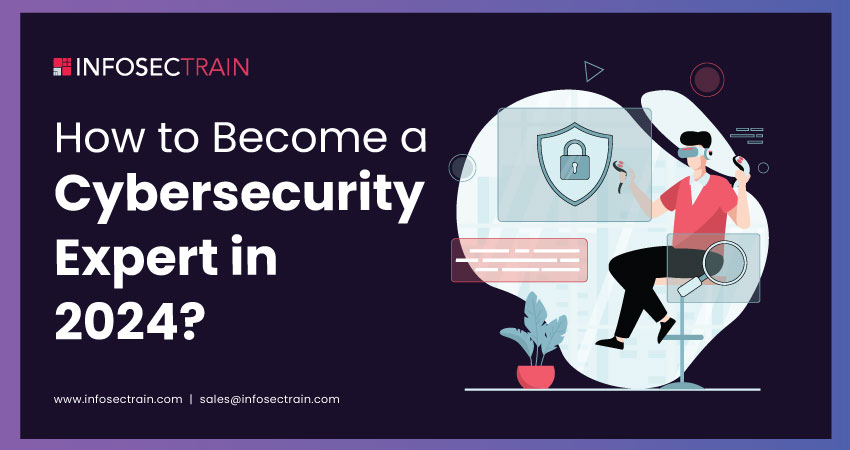How to Become a Cybersecurity Expert in 2024?
In the swiftly changing realm of cybersecurity, the significance of experts has never been more crucial. As we enter 2024, the demand for skilled professionals safeguarding our digital realm continues to soar. This guide is your roadmap to mastering the intricacies of cybersecurity and establishing yourself as an authority in the field. By understanding the basics, pursuing relevant education and certifications, and staying informed about emerging threats, you can embark on a journey to become a cybersecurity expert. With hands-on experience, specialization in niche areas, and a commitment to ethical practices, you’ll possess the tools to navigate the ever-changing challenges of the digital security terrain effectively. Join us in unraveling the path to cybersecurity expertise in the year 2024.

Who is a Cybersecurity Expert?
A cybersecurity expert is a skilled professional proficient in safeguarding digital systems, networks, and data. They analyze and mitigate cybersecurity risks, implement robust defense mechanisms, and stay updated on evolving threats. Proficient in ethical hacking and secure solution development, they formulate strategies to protect sensitive information. Their role spans programming, network security, incident response, and risk management, which is crucial in fortifying digital infrastructures against ever-evolving cyber threats.
Different Types of Experts
1. Red Team: The red team, or ethical hackers, actively seek network vulnerabilities, simulating real attacks to identify weaknesses and enhance defenses, contributing to a more robust cybersecurity posture.
2. Blue Team: The blue team acts as the defense force, monitoring systems, detecting and investigating threats, and implementing security measures to safeguard organizational assets against cyber attacks.
3. Digital Forensics Experts: Digital forensics experts gather and analyze digital evidence post-cyber attacks, reconstructing events to aid investigations. They play a crucial role in uncovering insights and supporting the resolution of security incidents.
4. Security Architects: Security architects concentrate on designing and implementing secure technology infrastructure, considering technical and organizational cybersecurity aspects. Their role involves creating robust systems to ensure comprehensive protection against potential threats.
5. Threat Intelligence Analysts: Threat intelligence analysts monitor dynamic cyber threats, analyze attack patterns, and provide insights to shape proactive defensive strategies. They ensure organizations stay ahead of potential adversaries. Their role involves staying vigilant and informed to enhance cybersecurity preparedness.
Cyber Security Expert Skills
1. Technical Proficiency: Adapting an understanding of fundamental security principles such as cryptography, network security, operating systems, incident response, and threat detection establishes a foundational solid expertise. This mastery serves as a cornerstone for effective cybersecurity practices.
2. Specialized Expertise: Specialized expertise in Red Team penetration testing or Blue Team defense showcases a nuanced understanding of cloud security, forensics, or threat intelligence, illustrating a tailored and in-depth proficiency. This specialization enhances effectiveness in addressing specific cybersecurity challenges within the chosen domain.
3. Scripting and Automation: Efficient utilization of scripting languages such as Python or Bash enables task automation, streamlines processes, and optimizes overall efficiency in cybersecurity operations. This proficiency empowers professionals to automate repetitive tasks, allowing for a more agile and responsive security environment.
4. Adaptability and Continuous Learning: Demonstrating adaptability and the capability to comprehend emerging technologies like cloud security, AI/ML in security, and blockchain security reflects a steadfast commitment to staying informed in the dynamic cybersecurity landscape. This commitment ensures ongoing relevance and effectiveness in addressing the evolving challenges within the field.
5. Tool Proficiency: Proficiency in employing security tools like SIEM, IDS/IPS, vulnerability scanners, and incident response platforms showcases an adept utilization of technology for implementing thorough security measures. This expertise enhances the ability to monitor, detect, and respond effectively to potential cybersecurity threats.
How to Become a Cybersecurity Expert in 2024?
1. Build a Solid Foundation:
Establish a strong foundation for your cybersecurity journey by acquiring a bachelor’s degree in computer science, information security, or a related field. Alternatively, gain essential knowledge through online courses or boot camps. Focus on mastering fundamental concepts such as cryptography, network security, operating systems, and incident response. Validate your understanding with CompTIA Security+ and CEH certifications, ensuring a solid educational groundwork for your cybersecurity expertise.
2. Choose Your Specialization:
Select your cybersecurity specialization based on your preference: engage in vulnerability hunting as a hacker with the Red Team or defend systems against attacks as part of the Blue Team. Each path demands distinct skill sets and certifications tailored to your chosen role. Additionally, consider emerging areas such as cloud security, threat intelligence, and digital forensics, researching certifications to align with your interests and career goals.
3. Refine your Practical Cybersecurity Skills:
Hone your practical cybersecurity skills by engaging in hands-on experiences with online labs and virtual machines and Capture the Flag (CTF) competitions on platforms like HackTheBox and VulnHub. These environments provide challenging scenarios to test and enhance your abilities. Additionally, contribute to open-source security tools and projects to gain valuable real-world experience, establishing a robust portfolio that showcases your hands-on expertise in the field.
4. Network and Stay Updated:
Stay connected and updated in cybersecurity by actively engaging with the community. Participate in online forums, attend conferences, and connect with professionals to gain insights and stay ahead. Embrace continuous learning as the industry evolves swiftly; regularly peruse security blogs, news, and research papers to stay well-informed about the latest threats and vulnerabilities. This proactive approach ensures that you remain abreast of industry trends and developments, contributing to your effectiveness as a cybersecurity professional.
5. Certifications Can Boost Your Resume:
Enhance your resume strategically by selecting certifications that align with your chosen specialization, emphasizing industry-recognized credentials. While certifications validate your knowledge and commitment, remember that they complement expertise, not a substitute. Foster a dedication to continual learning. Progress your career by pursuing advanced certifications to stay informed on the latest developments, reinforcing your professional advancement. This strategy guarantees a versatile and constantly evolving skill set.
Cyber Security Expert Salary in India
Experience
- Entry-level: ₹4.7 Lakhs – ₹6 Lakhs
- Mid-level: ₹6 Lakhs – ₹8 Lakhs
- Senior-level: ₹8 Lakhs – ₹10 Lakhs
Skills and Certifications:
- Specialized skills like penetration testing, cloud security, or threat intelligence can increase salary by 10-20%.
- Relevant certifications like CISSP, CISA, or CEH can boost pay by 10-20%.
- Low end: ₹5.0 Lakhs per year Approx
- Average: ₹7.3 Lakhs per year Approx
- High end: ₹15.0 Lakhs per year Approx
Skills and Certifications:
Specialized network security, cloud security, or security architecture skills can significantly boost your salary. Relevant certifications like CCNA Security, CEH, or CISA can also increase your earning potential by 10-20%.
Cyber Security Consultant:
- Low end: ₹6.0 Lakhs per year Approx
- Average: ₹11.2 Lakhs per year Approx
- High end: ₹24.0 Lakhs per year Approx
Skills and Certifications:
Specialized skills like penetration testing, incident response, or threat intelligence can significantly boost your salary. Relevant certifications like CISSP, CISA, or CEH can also increase your earning potential by 10-20%.
Cyber Security Associate:
- Low end: ₹2.5 Lakhs per year Approx
- Average: ₹6.1 Lakhs per year Approx
- High end: ₹14.0 Lakhs per year Approx
Skills and Certifications:
Specialized skills in specific areas, such as security awareness training, vulnerability management, or essential incident response, can boost your salary. Relevant certifications, like CompTIA Security+ or CEH, can also increase your earning potential by 10-20%.
- Low end: ₹3.0 Lakhs per year Approx
- Average: ₹5.1 Lakhs per year Approx
- High end: ₹8.0 Lakhs per year Approx
Skills and Certifications:
Specialized skills in intrusion detection systems (IDS), security information and event management (SIEM) tools, and incident response procedures can boost your salary. Relevant certifications like Security+, CEH, or CISSP can also increase your earning potential by 10-20%.
- Low end: ₹4.5 Lakhs per year Approx
- Average: ₹9.3 Lakhs per year Approx
- High end: ₹18.3 Lakhs per year Approx
Skills and Certifications:
Specialized skills in different types of penetration testing (web application, network, social engineering), knowledge of vulnerability assessment tools, and experience with coding languages like Python can significantly boost your salary. Relevant certifications like OSCP, CEH, or GPEN can also increase your earning potential by 10-20%.
How Can InfosecTrain Help?
Acquiring thorough cybersecurity knowledge is essential for safeguarding businesses and individuals in the face of escalating global cyber threats. InfosecTrain provides professional cybersecurity and cloud certification training, imparting vital skills for success in this dynamic field. Our courses, led by seasoned cybersecurity professionals, fortify defenses against evolving threats. Our Cyber Security Orientation Program is an excellent entry point for those starting a cybersecurity career. Stay ahead in the competitive landscape with InfosecTrain’s comprehensive training, gaining a crucial edge against cybercrime.




 1800-843-7890 (India)
1800-843-7890 (India) 
